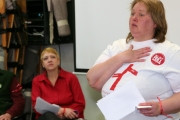Selkirk College National Day of Action quiet but passionate
The first National Day of Action protest for Selkirk College Grand Forks campus was a quiet but passionate one as students, faculty and community members supported the student union’s campaign to reduce tuition fees, drop student debt and increase education funding, Wednesday, Feb. 1.
Rather than focussing on the campaign itself, instructors, community members and students discussed how high tuition rates affect them and their families.
“We’re all here because we want to make a difference,” said Marlene Garcia, the student union representative for the Grand Forks campus, in her opening statements at 10 a.m.
The annual National Day of Action was sponsored by the Canadian Federation of Students (CFS). It is a day dedicated to spotlighting the need for the federal government to reduce tuition fees, drop student debt and increase education funding. Garcia handed out buttons, a petition and red ribbons to the more than a dozen people who attended the event so they could show their solidarity.
Garcia said collectively students owe the federal government more than $15 billion in student loan debts. The average B.C. student will leave school with a $27,000 student loan to pay back.
Ken Soroka, a Selkirk College instructor, father of three and a Simon Fraser University Alumni, said he still has a mortgage because he’s helping his kids, who are all over 20, through university.
“They will still be $35,000 to $45,000 in debt despite the help we’ve given them,” he said. “It just breaks my heart. I help as much as I can but they are still saddled with this debt.”
He accused the government of “pushing” instituitions like Selkirk into annually raising their tuition fees to the legal maximum of two per cent, year after year, by reducing the education funds and thereby passing their financial woes onto students.
“Tuition fee increases are one of the more painful and notable pieces of the larger picture created because of reduced funds to B.C. education,” said Soroka.
Selkirk College’s other student union representative, Janice Podovinikoff, echoed Soroka’s sentiment. She is the mother of two boys, aged 20 and 23, who are both attending post secondary. She herself is going through Adult Basic Education to complete her Dogwood Diploma.
She said students find themselves in a corner. They can’t get better paying jobs without the education, yet they often can’t find a decent paying job without it. She said in 1995 17 per cent of Canadian students owed over $25,000 in student loans. Today that number has jumped to 37 per cent.
“You can see where it is going, people are just owing and owing and owing,” she said.
She had to co-sign for her boys’ student loans.
“It’s been tough because I haven’t got the income if they (default on their loans),” she said.
Grandparents also weighed in on the discussion. Louise Heck, who works in early childhhood education, spoke about her concerns as a mother of four and now a grandmother of eight, including her oldest granddaughter, who is graduating this year.
“I am concerned she will be embarking on this road to debt,” said Heck, suggesting that maybe the government’s priorities are all wrong and instead of paying for a war in Afghanistan, they should be helping out here at home.
“Education is right and it doesn’t stop at grade 12,” she said.
“(My eight year-old daughter) will be hitting the system all too soon and it’s a worry,” said Jim Leitch, instructor at Selkirk College and an alumni of Simon Fraser University, University of British Columbia and University of Calgary.
“I’m afraid that by the time she gets there we won’t only be talking about debt and cost but as yes or no and whether she can go,” said Leitch. “There are people for whom it will be a no.”
The event also included comments by Grand Forks mayor Brian Taylor and Selkirk College instructor Christy Luke.
Garcia and Podovinikoff represent the more than 60 full-time and part-time students who attend the Selkirk College Grand Forks campus.






















